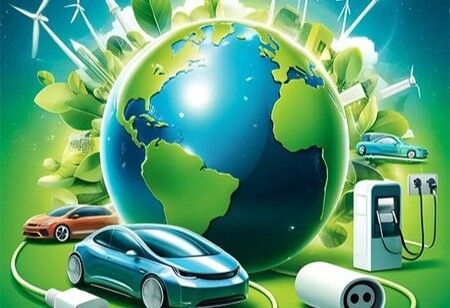
World EV Day 2025: Steering India towards a Sustainable Tomorrow


World EV Day highlights sustainable transportation and the movement away from fossil fuel-powered automobiles toward environmentally friendly options. This observance represents more than just a date on the calendar; it serves as a call to action, demonstrating how unified efforts can transform the transportation landscape. As urban areas become increasingly crowded and air pollution emerges as a critical issue, the need for electric vehicle adoption has reached unprecedented levels of importance.
India, along with nations worldwide, faces the consequences of environmental changes and metropolitan air contamination. World EV Day 2025 unites policymakers, vehicle manufacturers, and the public to build support for electric transportation solutions.
World EV Day
World EV Day emerged as an international initiative to honor and speed up the shift toward electric transportation. Launched in 2020, it has rapidly evolved into a worldwide commemoration that brings communities together to educate themselves, exchange ideas, and take action in favor of eco-friendly transportation solutions.
Throughout its brief history, World EV Day has earned global acknowledgment. Government officials, business executives, and the general public now recognize it as an annual prompt to further advance electric vehicle adoption. Within India, related activities and promotional efforts have consistently grown, with an increasing number of individuals demonstrating enthusiasm for electric vehicles, establishing it as a significant milestone in the country's sustainable transportation objectives.
Anish Raghunandan, President & Client Partner – TML Group, Tata Technologies, says, “The global shift to electric mobility is not just an industry trend, but it is a societal imperative. As nations pursue a greener future and consumers demand sustainable choices, the EV industry stands at a decisive crossroads—where innovation must meet purpose. At Tata Technologies, we’re accelerating this transformation through our deep domain expertise, digital engineering capabilities, and global partnerships with leading OEMs. Our focus goes beyond the vehicle; we’re reimagining the entire value chain, from responsible sourcing to digital compliance and sustainable manufacturing.
“The theme for this World EV Day, The Better Manifesto, is a timely call to action. It urges all of us to move from intent to impact—to engineer solutions that are not only better for businesses but better for people and the planet too. Together, we can make electric mobility not just a technological shift, but a symbol of positive change for generations to come,” adds Anish.
How is EV shaping the future?
Electric vehicles represent more than a fad; they are transforming how people move around in India. These vehicles address major issues we face today: cutting down pollution, decreasing expenses, and providing modern technological features to regular travelers.
Transitioning to electric vehicles has a direct effect on the quality of air we breathe. Electric-powered cars produce zero emissions from their exhaust systems, resulting in reduced carbon dioxide output and purer air in urban areas. This contributes to decreasing pollution haze and aids India in fulfilling its commitment to reducing greenhouse gas emissions.
Also Read: Top 7 Women Leading the Way for Clean Energy Transition
Electric vehicles offer compelling financial advantages as one of their primary appeals. When compared to gasoline or diesel-powered cars, EVs contain fewer mechanical components, resulting in reduced maintenance costs. Vehicle owners experience substantial long-term financial benefits.
Government assistance further facilitates this transition. Programs like the FAME India Scheme, PM E-Drive Scheme, and regional policies including Maharashtra's EV Policy and Delhi's EV Policy provide subsidies, tax advantages, and various incentives. These initiatives motivate more people to embrace electric vehicle technology.
Tech Innovation
Electric vehicle technology has experienced significant advancement in recent years. Cutting-edge lithium-ion batteries and emerging solid-state battery technology are extending the distance vehicles can travel between charges. This development tackles range anxiety, which remains a primary concern among consumers.
Innovative charging technologies, such as swappable battery systems and mobile charging options, are enhancing user convenience and accessibility.
Also Read: WAVES 2025: Burgeoning India's Orange Economy
Through artificial intelligence integration and smartphone application compatibility, electric vehicles now provide live data updates, smart route planning, and vehicle performance analytics. These technological improvements support programs like global EV Charging Day, an initiative designed to increase public understanding of efficient and environmentally friendly charging methods.
Obstacles to Electric Vehicle Acceptance
While transitioning to electric vehicles presents certain obstacles, India is fortunately already implementing measures to address these issues. Although charging infrastructure remains in development, both government entities and private sector companies are putting money into establishing thousands of additional charging stations across the country. This development reduces concerns about locating charging facilities. Likewise, issues related to driving range and battery durability are being addressed through technological innovations and improved battery systems.
Although electric vehicles may appear expensive initially, government incentives, reduced operational expenses, and ongoing battery improvements will make them increasingly accessible. The recycling and environmentally safe disposal of batteries are receiving priority attention, guaranteeing sustainability across the entire product lifecycle.
Additionally, educational initiatives are expanding, assisting consumers in learning how electric vehicles can integrate into their daily lives, particularly through global campaigns like EV Day that emphasize the significance of electric transportation.
Also Read: Will GST Reform Benefit the Common Man? Leaders Talk
The Prospects of E-Mobility
India's electric vehicle sector holds tremendous potential for growth and innovation. Advanced technologies like solid-state battery systems and high-speed charging infrastructure are emerging; offering reduced charging duration and enhanced vehicle longevity.
Combining EVs with clean energy sources will enhance the environmental benefits of electric vehicle adoption. Electric two-wheelers are also gaining momentum, providing eco-friendly transportation solutions for countless urban travelers. This transformation promises India cleaner urban environments and more economical transportation alternatives.